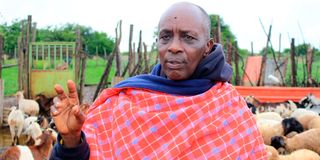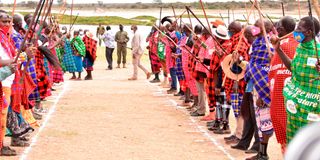Elders lead the charge: How cultural guardians are transforming the fight GBV

Samuel Lolkitekui, speaking during an interview at his home in Suguta Mar Mar in Samburu County on August 23, 2024. He is a leading male champion fighting against FGM, child marriage and championing girl child education.
What you need to know:
- Elders, once enforcers of harmful practices like FGM, are now leading the fight against GBV through historic declarations and community advocacy.
- A Kenya-Finland partnership has transformed these cultural guardians into champions for girls' rights, resulting in significant declines in GBV rates in high-prevalence counties.
When Samuel Lolkitekui, a retired police officer from Longolat village in Samburu County, took a stand against female genital mutilation (FGM) for his daughters, he could not have imagined the ripple effect his decision would create across his community.
"I stood very firm against the retrogressive culture that required my daughters to be cut. I said a big no and instead sent them to school. They have now all finished university and are working. I also influenced my brothers who also followed in my footsteps," Lolkitekui tells Nation.Africa in an interview.
His story embodies the quiet revolution taking place in parts of Kenya where cultural guardians—the very elders who once upheld harmful traditional practices—are now leading the charge against gender-based violence (GBV).
A promising partnership
In October 2021, Kenya and Finland embarked on an ambitious bilateral program to strengthen prevention and response to GBV in the country. The three-year initiative saw Finland contribute €5 million and Kenya €1 million to finance the project, which was implemented in three counties with some of the highest GBV rates in the country: Bungoma, Kilifi, and Samburu.
As the program concluded in December last year, impact assessment reports reveal a significant decline in GBV prevalence in Bungoma and Samburu counties—a success largely attributed to the engagement of traditional elders.
The historic Kisima Declaration
In 2021, Samburu elders gathered at Kisima grounds—a sacred site where blessings and solemn declarations are made for the community—and signed the historic Kisima Declaration. In this watershed moment, elders drawn from the six sacred mountains of Samburu resolved to end FGM and child marriage in their community.
Perhaps most significantly, they lifted a cultural curse on uncircumcised girls, allowing them to be accepted in the community and participate in cultural celebrations and rites that were previously forbidden to them.
Lolkitekui, who was part of this declaration, did not stop at protecting his own family. He began engaging other men, enlightening them about the dangers of FGM and child marriage, and emphasizing the importance of girls' education.
"I have, together with other male champions who I have recruited, traversed the vast Samburu County spreading the gospel against FGM, child marriage and the importance of girl education," he explained.
These elders now pitch tents at schools and churches and hold public barazas to sensitise pupils, students, and local communities about the dangers of harmful cultural practices. Their campaigns also educate people about the legal ramifications of FGM, child marriage, and denying children education—efforts conducted in conjunction with both government and non-governmental organizations.
"From the campaigns that we have been conducting across the county, it is good to note that cases of FGM and child marriage have greatly gone down. We also now have many girls going to school," Lolkitekui notes proudly.
"We are now very vigilant in the villages against such outlawed cultural practices from happening. If you empower a girl or a woman, you empower the entire community."

Former President Uhuru Kenyatta with Samburu elders during the Kisima Declaration against FGM at Kisima in Samburu County, in 2020.
The Sabaot Declaration
The ripple effect of the Kisima Declaration reached other communities. In 2023, the supreme council of Sabaot elders made a similar declaration denouncing FGM and child marriage.
The six sub-clans of the Sabaot—Someek, Agiek, Bong'omek, Bok, Koony, and Sabiny—led by their supreme council, signed a declaration to end FGM and all forms of harmful cultural practices targeting women and girls in their communities.
These elders have also championed alternative rites of passage that emphasize dignity, respect, and honour for women and girls by eliminating cultural biases that cause stigma and discrimination.
The impact of cultural leadership
Speaking during the way forward conference held in Kilifi County to review the impact of the Kenya-Finland partnership, Gender and Affirmative Action Principal Secretary Anne Wang'ombe lauded the program's interventions, particularly its localized approaches.
"The male engagement initiatives and capacity-building efforts of the program have shifted gender norms and empowered local communities to lead the fight against GBV, which is commendable," said Anne.
The Embassy of Finland in Kenya also praised the project, describing it as transformative in the fight against GBV in the country.
"As we close the bilateral program between Kenya and Finland, certified counsellors are now providing services to survivors across the three counties and key moral duty bearers are leading the transformation in the communities," the Finland Embassy said in a statement.
Tony Mwebia of Men End FGM Foundation, an organisation leading a campaign to mobilise men in the fight against FGM, telld Nation.Africa that involving elders represents a crucial step toward ending the practice.
"The involvement of elders in the FGM fight serves the purpose of popular mobilisation and should be popularised through local media engagements and barazas. This will allow organised diffusion to take place within the community and ensure everyone is aware of the bold step taken by the elders," says Mwebia.
Beyond declarations
Since 2022, the Kenya-Finland Bilateral Program has supported the three counties to develop and implement region-specific strategies addressing child marriage, FGM, and gender violence, among other socio-cultural barriers to women's and girls' empowerment.
The program has trained more than 600 duty bearers and essential service providers in counselling psychology, mediation, and substance abuse prevention to enable them to deliver effective support and intervention to survivors and victims.
In Bungoma and Samburu counties, it has conducted successful campaigns to challenge retrogressive mindsets and cultural norms. Through community dialogues, elders and cultural leaders have committed to finding alternatives to harmful practices, leading to community declarations against FGM.
Meanwhile, in Kilifi County, the program has supported the establishment of a rescue centre and safe houses in collaboration with the County Government.
The challenge ahead
Despite this progress, challenges remain significant. Bungoma County, in particular, has been in the spotlight for its high rates of teenage pregnancy and sexual and gender-based violence.
According to county statistics, a total of 106,982 girls aged 10-19 became pregnant between January 2016 and August 2023. The county's teenage pregnancy prevalence stood at 19 percent—exceeding the national prevalence of 15 percent.
Similarly, Bungoma's sexual and gender-based violence prevalence was 23 percent, compared to the national prevalence of 13 percent during the same period.
From January 2016 to July 2023, the county recorded 9,089 cases of sexual and gender-based violence among girls aged 10-17, compared to 18,510 cases reported countrywide for the same age group. In 2023 alone (from January to August), 299 pregnancies were recorded among girls aged 10-14, with an additional 8,375 pregnancies among girls aged 15-19.
A new path forward
What makes the Kenya-Finland partnership particularly effective is its recognition that sustainable change must come from within communities themselves. By engaging traditional power structures and transforming them into agents of positive change, the program has begun to shift deeply entrenched cultural norms. As the formal partnership between Kenya and Finland concludes, the legacy of empowered cultural leaders continues to grow. In villages across Samburu, Bungoma, and Kilifi, a quiet revolution continues—one conversation, one elder, one community at a time.


